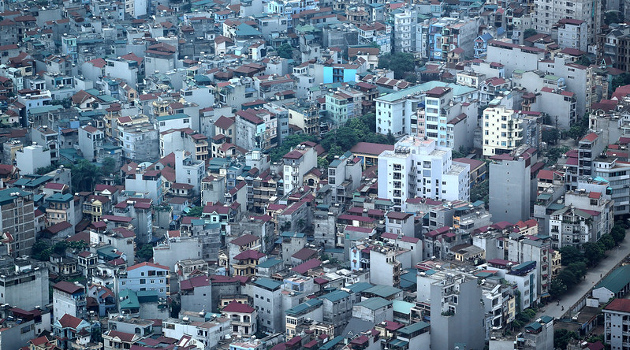Vietnam’s economic trajectory is similar to China’s.
- Horrible poverty and even starvation (in the case of China) during the days of hard-core communism.
- Less poverty today thanks to a few pro-market reforms starting in the 1980s.
- Still low-to-middle income jurisdictions because they’re stuck in the third circle of “statist hell.”
This chart from the Fraser Institute’s Economic Freedom of the World shows that Vietnam and China both rank way below Singapore and Hong Kong.

Since China used to have scores below 4, being above 6 is a lot of progress. And something similar presumably happened with Vietnam (though it only produced enough data to get scores starting in 2000).
The interesting question is what happens to these countries in the future. Will there be a new round of pro-market reform, allowing them to start converging with rich nations? Or will they tread water, doomed to be – at best – middle-income countries because of inadequate economic liberty?
I’ve written many times (here, here, here, here, here, here, here, here, here, here, here, here, here, and here) that I’m worried about China.
But let’s focus today on Vietnam. I wrote last year about that country’s partial liberalization, noting that “Vietnam has take the first steps in what hopefully will be a long journey.”
Well, “hopefully” may turn into “actually.”
Why am I now more optimistic?
Because of a report last week in Bloomberg. Authored by Francesca Stevens, Nguyen Dieu Tu Uyen, and Nguyen Xuan Quynh, it described how Vietnam may be copying Javier Milei’s radical pro-market reforms.
Here are some excerpts.
As Elon Musk and Argentina’s Javier Milei champion ambitious plans to dramatically slash the size of government, a similar effort is getting underway across the globe from political leaders with a completely different ideology: Vietnam’s Communist Party. In what amounts to the biggest overhaul of the state since adopting pro-market reforms in the 1980s, Vietnamese officials are targeting a roughly 20% reduction in the size of ministries, government agencies, and civil service workforce. It’s being pitched as essential medicine to remedy a bloated bureaucracy, reduce red-tape and cut unnecessary costs from local governments on up. The plans would see five ministries abolished… Four government agencies, including the State Capital Management Committee, will be eliminated. Five state television channels, 10 newspapers and 19 magazines will be scrapped. …“This is a very urgent issue which must be done,” Lam said in a speech posted on the Communist Party’s website in December. “Sometimes we have to take bitter medicine, endure pain and cut out tumors in order to have a healthy and strong body,” he said. …civil servants are clearly stressed — one deputy prime minister said 100,000 jobs would be affected… “reforms…are necessary to achieve their goal of high-income status by 2045,” ISEAS-Yusof Ishak Institute’s Giang said.
This report is very exciting, though time will tell whether the nominal communists running Vietnam genuinely intend to shrink the burden of government.
In other words, I want to see actual evidence of smaller government, not just rhetoric. As the great Ronald Reagan said, “trust but verify.”
That being said, I’ll close with two optimistic comments.
- First, the people of Vietnam seem to be naturally supportive of free enterprise.
- Second, if Vietnam adopts a Milei-style agenda, the country will enjoy Milei-style results.
Incidentally, if I’m right on the second point, then the Fourth Theorem of Government kicks in.
Reforms continue and Vietnam joins the club of Asian Tigers.
P.S. This column illustrates why Milei’s importance extends way beyond Argentina. Yes, it will be great if he turns Argentina from a statist disaster to a free-market success. But I’m even more excited about him showing the rest of the world that dramatic free-market reforms are the way to go. Sort of the Washington Consensus, but on steroids.
———
Image credit: World Bank Photo Collection | CC BY-NC-ND 2.0.


